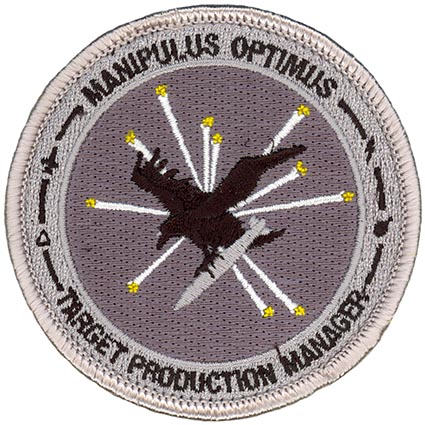Description
Computer made/mounted on velcro 3.0 inch/77mm
AIR FORCE LIFE CYCLE MANAGEMENT CENTER
The Air Force Life Cycle Management Center is one of six centers reporting to the Air Force Materiel Command.
Led by a 3-star general officer, AFLCMC is charged with life cycle management of Air Force weapon systems from their inception to retirement.
The AFLCMC mission: “Acquire and Support War-Winning Capabilities”
The AFLCMC motto: “AFLCMC…Providing the Warfighter’s Edge”
Adherence to AFLCMC guiding principles enables AFLCMC personnel to meet their goal to “Deliver to Commitments”
- Speed with Discipline
- Trust & Confidence
- Unity of Purpose
AFLCMC provides holistic management of weapon systems across their life cycle and simplifies/consolidates staff functions and processes to curtail redundancy and enhance efficiency. AFLCMC’s operating structure provides an integrated framework for decision making and process optimization across the weapon system life cycle.
AFLCMC people work closely with their counterparts at the other five AFMC centers, each with a core mission focus: Air Force Research Laboratory (science & technology); Air Force Test Center (test & evaluation); Air Force Sustainment Center (maintenance, repair, overhaul and supply chain management); Air Force Nuclear Weapons Center (strategic systems); and the Air Force Installation and Mission Support Center (installation support).
ORGANIZATION: AFLCMC’s portfolio includes: Information Technology systems and networks; Command, Control, Communications, Intelligence, Surveillance and Reconnaissance systems; armaments; strategic systems; aerial platforms; and various specialized or supporting systems such as simulators and personal equipment. AFLCMC also executes sales of aircraft and other defense-related equipment while building security assistance relationships with foreign partner nation air forces.
Approximately 26,000 AFLCMC airmen, civilian and contractor employees perform the center’s mission from nine major locations and dozens of smaller sites.
The AFLCMC commander is responsible for the organize, train and equip functions of the center to include life-cycle management processes and is supported by staff and functional offices.
Each Program Office reports to one of 10 Program Executive Officers (PEOs) who are accountable for the activities within their portfolio and who report to the Air Force Service Acquisition Executive at the Pentagon (Assistant Secretary of the Air Force for Acquisition).
AFLCMC execution directorates provide direct program support such as engineering, technical order management, developmental planning, contracting, and source selection assistance.
The execution directorates include: Program Execution; Technical Engineering Services; Financial Management Mission; Logistics Services; Contract Execution; Cyber & Analysis Programs; Program Development & Integration; and Intelligence. The Air Force Security Assistance and Cooperation Directorate oversees execution of the foreign military sales mission. The Propulsion Directorate oversees engine acquisition and product support.
The 66th Air Base Group at Hanscom AFB, Mass., and the 88th Air Base Wing at Wright-Patterson AFB, Ohio, provide base operating support at those locations and also report to AFLCMC.
HISTORY: The Air Force Life Cycle Management Center activated on July 9, 2012. It is a key element of AFMC’s transition from 12 to five centers (a sixth center stood-up on October 1, 2014). Key goals of AFLCMC are to improve weapon system acquisition and product support, simplify and reduce overhead structure, and eliminate redundancies by consolidating staff functions and processes.
The AFLCMC consolidated missions previously performed by the Aeronautical Systems Center and Air Force Security Assistance Center at Wright-Patterson AFB, the Electronic Systems Center at Hanscom AFB, and the Air Armament Center at Eglin AFB, Fla. One of the AFLCMC’s signature elements is to provide oversight of most program office personnel previously aligned in Aerospace Sustainment Directorates at each of the three former Air Logistics Centers located at Robins, Hill, and Tinker Air Force Bases. These program offices remain in place but now report to PEOs in the AFLCMC.
